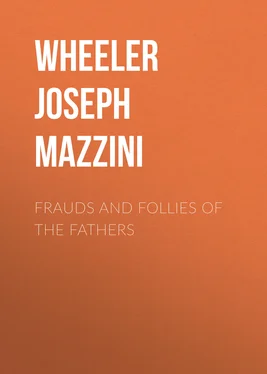Joseph Wheeler - Frauds and Follies of the Fathers
Здесь есть возможность читать онлайн «Joseph Wheeler - Frauds and Follies of the Fathers» — ознакомительный отрывок электронной книги совершенно бесплатно, а после прочтения отрывка купить полную версию. В некоторых случаях можно слушать аудио, скачать через торрент в формате fb2 и присутствует краткое содержание. Жанр: foreign_prose, foreign_religion, Философия, foreign_psychology, foreign_antique, на английском языке. Описание произведения, (предисловие) а так же отзывы посетителей доступны на портале библиотеки ЛибКат.
- Название:Frauds and Follies of the Fathers
- Автор:
- Жанр:
- Год:неизвестен
- ISBN:нет данных
- Рейтинг книги:5 / 5. Голосов: 1
-
Избранное:Добавить в избранное
- Отзывы:
-
Ваша оценка:
- 100
- 1
- 2
- 3
- 4
- 5
Frauds and Follies of the Fathers: краткое содержание, описание и аннотация
Предлагаем к чтению аннотацию, описание, краткое содержание или предисловие (зависит от того, что написал сам автор книги «Frauds and Follies of the Fathers»). Если вы не нашли необходимую информацию о книге — напишите в комментариях, мы постараемся отыскать её.
Frauds and Follies of the Fathers — читать онлайн ознакомительный отрывок
Ниже представлен текст книги, разбитый по страницам. Система сохранения места последней прочитанной страницы, позволяет с удобством читать онлайн бесплатно книгу «Frauds and Follies of the Fathers», без необходимости каждый раз заново искать на чём Вы остановились. Поставьте закладку, и сможете в любой момент перейти на страницу, на которой закончили чтение.
Интервал:
Закладка:
The history of Clement of Rome, says Canon Westcott ("On the Canon," p. 22,1881), "is invested with mythic dignity which is without example in the Ante-Nicene Church." It was too utterly impossible for other Fathers and founders of the Church to be invested with mythic dignity. Jesus must have come of the seed of King David, even though Joseph had nothing to do with his genealogy. "The events of his life," Westcott goes on to say, "have become so strangely involved in consequence of the religious romances which bear his name, that they remain in inextricable confusion." And so indeed they are; almost as badly as those of the founder of Christianity.
Clement is called at one time a disciple of St. Paul, and at another of St. Peter, who Paul withstood to his face because he was to be blamed (Gal. ii., 11). The Abbé Migne, in his Patrologie, makes him Pope in 91 A.C. The Clementine Homilies, purporting to be written by Clement himself, says he was ordained by Peter. Some put the first Popes as Linus, Cletus, Anacletus, and then Clement; others give their order as Linus, Cletus, Clement, Anacletus; others Clement, Linus, &c.; in short, they are given every way. Baron Bunsen called Anacletus a purely apocryphal and mythical personage, and some wicked sceptics have thought the same of the whole batch. In addition to the two epistles which stand on the same parchment with Holy Scripture, St. Clement is credited with two epistles to Virgins—which, though superstitious, are possibly none the less authentic; two epistles to James the brother of the Incarnate God, the Apostolic Canons (which include his own writings as sacred scripture), the Apostolic Constitutions, the Recognitions, a Liturgy, and twenty Clementine Homilies. All of these, says Mosheim, were fraudulently ascribed to this eminent father by some deceivers, for the purpose of procuring them greater authority. Clement has also been supposed the author of the Epistle to the Hebrews and the Acts of the Apostles.
Restricting ourselves for the present to the first epistle, generally put forward as genuine, until a comparatively late date quoted as authoritative scripture by the Fathers, put in the apostolic canons among sacred and inspired writings, and which Eusebius tells us ("Hist. Eccl." iii., 16) was publicly read in very many churches in old times and even in his own day; we at once discover evidence that the writer could not have been akin to the Caesars or of a noble Roman family. He bespeaks his Jewish birth by his continual citation of the Jew books, by his references to the services at Jerusalem (chaps. xl. and xli.), and by speaking of "our father Jacob." But, like other Christian writers, he is very loose in his quotations. For instance, he jumbles up the first Isaiah and an apocryphal Ezekiel in the following quotation, "Say to the children of my people, Though your sins reach from earth to heaven, and though they be redder than scarlet and blacker than sackcloth, yet if ye turn to me with your whole heart, and say, 'Father,' I will listen to you as to a holy people." 2 2 Pp. 12 and 13, vol i., "Ante-Nicene Christian Library. "All our citations, unless otherwise mentioned, will be taken from this valuable series of volumes.
He mentions (chap, lv.) "the blessed Judith," which book, by the way, Volkmar and others think must be dated a.c. 117-118. He also (chap, xvii.) quotes Moses as saying, "I am but as the smoke of a pot," and other passages (chap. xxiii.-xxvi), probably from the apocryphal "Assumption of Moses." But this is no worse than Matthew (ii., 23) quoting as from the prophets, "He shall be called a Nazarene;" Paul's wrongly quoting the Psalms (Eph. iv., 8); or Jude (ver. 14) citing the apocryphal book of Enoch as by "the seventh from Adam." But it somewhat vitiates his supposed testimony to the canonical books. It is evident, however, that he was acquainted with Paul's Epistles to the Corinthians, and his own reads at times like a bad imitation of Paul.
The apostle to the Gentiles, and thereby the real founder of modern Christianity, disregarding a certain threat of its supposed founder (Matt, v., 22), ventured, in arguing for the resurrection, the somewhat questionable statement, "Thou fool, that which thou sowest is not quickened except it die" (1 Cor. xv., 36). Clement altogether outdoes this. He says (chap, xxv.):
"Let us consider that wonderful sign [of the resurrection] which takes place in eastern lands, that is, in Arabia and the countries round about. There is a certain bird which is called a phoenix. This is the only one of its kind, and lives five hundred years. And when the time of its dissolution draws near that it must die, it builds itself a nest of frankincense and myrrh, and other spices, into which, when the time is fulfilled, it enters and dies. But as the flesh decays a certain kind of worm is produced, which, being nourished by the juices of the dead bird, brings forth feathers. Then, when it has acquired strength, it takes up that nest in which are the bones of its parents, and bearing these it passes from the land of Arabia into Egypt, to the city called Heliopolis. And, in open day, flying in the sight of all men, it places them on the altar of the sun, and, having done this, hastens back to its former abode. The priests then inspect the registers of the dates, and find that it has returned exactly as the five hundredth year was completed." This is the way the Christian evidences were presented by the authoritative head of the Church in the first century. Tertullian ("De Resurr. Cam.," sec. 10), takes Psalm xcii., 12, as referring to this prodigy. St. Cyril of Jerusalem, St. Ambrose, St. Gregory, St. Epiphanius, and other of the Fathers, follow Clement in his fable. It is said that Clement in this only followed Herodotus, Pliny, Ovid, and Tacitus, who mention the phoenix. This is false. Herodotus (ii., 13) simply relates the report of others, and does not intimate that he believed any part of it, but positively declares that some of the statements were not credible. Pliny ("Nat. Hist," x., 2) states expressly that the accounts may be fabulous. Ovid ("Metam.," xv., 392) uses the legend for poetical purposes. Tacitus ("Ann.," vi., 28) declares that the statements are uncertain. These, be it remembered, were unenlightened heathen, but the apostolic saint founds the distinguishing article of the Christian creed upon this mistake of an Egyptian myth. May it not have been a phoenix, instead of a dove, which descended on Jesus at Jordan? The cherubim described by Ezekiel were curious fowl. There are some queer animals mentioned in the Apocalypse; Isaiah and Job mention unicorns, and the former dragons. The Jews were indeed great in the natural-history department. Rabbinical references to the phoenix are numerous. The Talmud speaks of the zig, a bird of such magnitude that when it spread out its wings the disc of the sun was obscured; and the bar-juchne, one of whose eggs once fell down and broke three hundred cedars and submerged sixty villages. 3 3 See B. H. Cowper's article on the Talmud, in "The Journal of Sacred Literature," Jan., 1868.
The second epistle, or rather homily, of Clement, though equally bound up with the sacred records, and placed in the Apostolical Canon, is admitted to be spurious, and is every way less notable. The concluding leaves of the Alexandrian manuscript have been lost. It ends abruptly with this interesting chapter:—
"Let us expect, therefore, hour by hour, the kingdom of God in love and righteousness, since we know not the day of the appearing of God. For the Lord himself, being asked by one when his kingdom would come, replied, 'When two shall be one, and that which is without as that which is within, and the male with the female, neither male nor female.' Now, two are one when we speak the truth one to another, and there is un-feignedly one soul in two bodies. And 'that which is without as that which is within' meaneth this: He calls the soul 'that which is within,' and the body 'that which is without.' As, then, thy body is visible to sight, so also let thy soul be manifest by good works. And 'the male with the female, neither male nor female, this "....
Читать дальшеИнтервал:
Закладка:
Похожие книги на «Frauds and Follies of the Fathers»
Представляем Вашему вниманию похожие книги на «Frauds and Follies of the Fathers» списком для выбора. Мы отобрали схожую по названию и смыслу литературу в надежде предоставить читателям больше вариантов отыскать новые, интересные, ещё непрочитанные произведения.
Обсуждение, отзывы о книге «Frauds and Follies of the Fathers» и просто собственные мнения читателей. Оставьте ваши комментарии, напишите, что Вы думаете о произведении, его смысле или главных героях. Укажите что конкретно понравилось, а что нет, и почему Вы так считаете.











